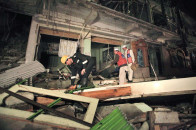Climate change disrupts education for millions
Child rights activist says school closures during disasters may lead to dropouts and reduce learning levels

Extreme weather events in recent years such as dense fog during winter and scorching heat in summer in Pakistan have disrupted school schedules, leading to closures, and as a result, hindering students’ learning.
The latest adjustment of the school schedules by the education ministry serves as a testament to the unpredictable climate patterns the schoolchildren face. Last year, cities like Lahore, Islamabad, and Rawalpindi experienced closures due to dense fog.
Moreover, smog-related shutdowns occurred in Punjab, contributing to respiratory issues and eye infections among students, particularly those from low-income backgrounds.
Rising temperatures also pose health risks, exposing vulnerable students to heat-related illnesses and dehydration. The climate change ministry also highlighted the escalating intensity and frequency of heatwaves in Pakistan’s plains.
“Recent weather records underscore the severity of this trend, with Pakistan experiencing some of the world’s highest temperatures in recent years,” ministry spokesperson Muhammad Saleem said in a statement to APP.
Pakistan is projected to endure more frequent and intense heatwaves. For instance, Jacobabad recorded temperatures exceeding 50°C in June 2021 and May 2022. Such extreme heat poses significant health risks, including heatstroke and dehydration.
Saleem emphasised a collaborative approach involving federal, provincial, and district-level departments to mitigate heatwave impacts. He highlighted the government’s efforts to bolster climate resilience, to safeguard lives and infrastructures.
Nasreen Shah, a senior educationist at a government institution, told APP that extreme weather conditions could disrupt schooling by making students uncomfortable and unable to focus, especially on hot days.
She pointed out that inadequate clothing and crowded classrooms contributed to discomfort and difficulty breathing, and at the same time crowded buses during hot summers also increased the risk of heat-related illnesses among children.
Shah emphasised the importance of ensuring school safety and continuous learning regardless of weather conditions, suggesting the need for strategies to prioritise students’ health and well-being above all else.
Doctors have advised immediate action if a child experienced heat-related illnesses such as high body temperature, rapid pulse, headache, and dizziness. Dr Gulam Fareed, a family physician, advised seeking medical aid in case symptoms worsened.
Child rights campaigner Bushra Iqbal Hussain underlined profound impact of climate events on children’s health. She cited the devastating floods of 2022, in which over 26,000 schools were destroyed, disrupting education for 3 million children.
She regretted that school closures during disasters resulted in dropouts and reduced overall learning levels. She urged concerted efforts to safeguard children, ensuring their resilience and readiness to confront the threats posed by climate change.



















COMMENTS
Comments are moderated and generally will be posted if they are on-topic and not abusive.
For more information, please see our Comments FAQ